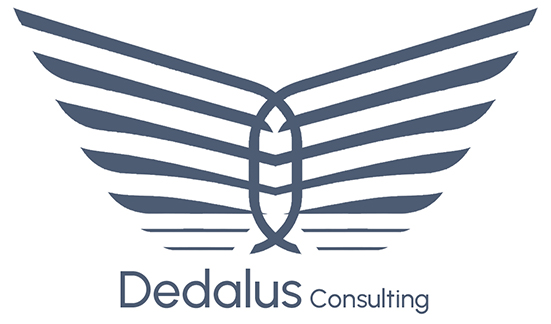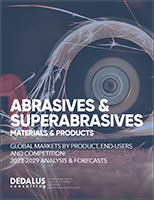Dedalus Consulting (www.dedalusconsulting.com), has recently updated Abrasives, Superabrasives & Abrasive Products–Global Markets, End-Users, Applications & Competitors: Analysis & Forecasts , the 10th edition of Dedalus’ in-depth research on the global abrasives industry, covering the market over the next five years.
According to Dedalus Consulting, the global abrasives market will surpass $21.0 billion in 2024 across all markets.
In this series, we looked at the latest trends, technological advancements, and strategic growth opportunities shaping the abrasives market through 2030. This final installment focuses on current trends, in particular the strategic moves by market leaders, and how they are navigating growth through innovation and partnerships.
As the abrasives industry evolves, market leaders are adopting strategic initiatives to navigate an increasingly complex landscape. From supply chain disruptions to sustainability pressures, companies are leveraging innovation, partnerships, and mergers to overcome key challenges and drive growth.
Key Market Challenges
• Supply Chain Disruptions: Global supply chain issues, exacerbated by geopolitical tensions and the lingering effects of the COVID-19 pandemic, are causing raw material shortages and driving up costs. Shipping bottlenecks and increased freight expenses are further pushing companies to explore localized supply chains and alternative sourcing.
• Rising Costs: The increasing costs of raw materials like superabrasives and fluctuating energy prices, coupled with stricter carbon regulations, are squeezing profit margins. Companies are under pressure to adopt energy-efficient technologies to mitigate these expenses.
• Sustainability Pressures: Stricter regulations on emissions, waste, and chemical use, especially in markets like the EU and North America, are forcing manufacturers to invest in greener production processes. This transition requires substantial investment, adding to the challenge of balancing regulatory compliance with cost-effectiveness.
• Intense Competition: The market is highly fragmented, with global and regional players vying for market share. Smaller, agile manufacturers offering niche solutions add to the competitive pressure, driving established companies to innovate and diversify their product portfolios continuously.
• Technological Integration: Incorporating advanced technologies like AI, automation, and additive manufacturing is a costly yet necessary transition. Additionally, the industry faces a skills gap, as employees need training to effectively manage these sophisticated systems.
Strategic Initiatives by Market Leaders
• Investment in R&D: Companies like 3M and Saint-Gobain Abrasives are investing heavily in R&D to develop high-performance, sustainable products. By focusing on advanced materials, smart abrasives, and eco-friendly technologies, they aim to meet complex customer needs while complying with environmental regulations.
• Partnerships and Collaborations: Strategic partnerships are enabling market leaders to expand their product offerings and integrate new technologies. For instance, Norton collaborates with machine tool manufacturers to optimize grinding solutions, while Tyrolit partners with tech firms to develop "smart abrasives" for enhanced process monitoring.
• Mergers and Acquisitions: Companies like CUMI and 3M are pursuing mergers and acquisitions to diversify their portfolios, access new markets, and adopt cutting-edge technologies. This strategy offers a quicker path to market expansion than organic growth and strengthens global positioning.
• Sustainability Focus: Leaders like Saint-Gobain are building brands that resonate with eco-conscious customers by investing in eco-friendly products, recyclable materials, and energy-efficient manufacturing processes. Green certifications, such as ISO 14001, further open new market opportunities, especially in regions with stringent environmental regulations.
Market leaders in the abrasives industry are navigating a landscape of supply chain disruptions, rising costs, sustainability pressures, and fierce competition by implementing strategic moves. By investing in R&D, forming partnerships, pursuing M&As, and focusing on sustainability, they are positioning themselves to meet evolving market demands and secure their competitive edge.
Dedalus Consulting (www.dedalusconsulting.com) has recently updated Abrasives, Superabrasives & Abrasive Products–Global Markets, End-Users, Applications & Competitors: Analysis & Forecasts, the 10th edition of Dedalus’ in-depth research on the global abrasives industry, covering the market over the next five years.
|
|
|
About Dedalus Consulting
Dedalus Consulting is a privately owned and independently operated market research publisher and consultancy.
Our research focuses on both emerging and mature markets in high-technology sectors, including tooling and machining, advanced materials, frequency control and timing, surge and circuit protection, energy and renewables, life sciences, and next generation computing. Research is continually updated through a methodology that is based on primary interviews with market participants, including manufacturers, end-users, research institutions, distribution channel representatives and service providers.
Our clientele is as diverse as the industries we serve, ranging from Fortune 500 juggernauts to pioneering academic institutions. Whether you're shaping the future of technology or driving innovation, Dedalus Consulting is your indispensable partner in navigating the complexities of today's high-tech landscape.

